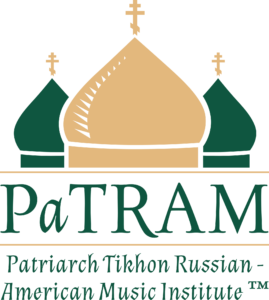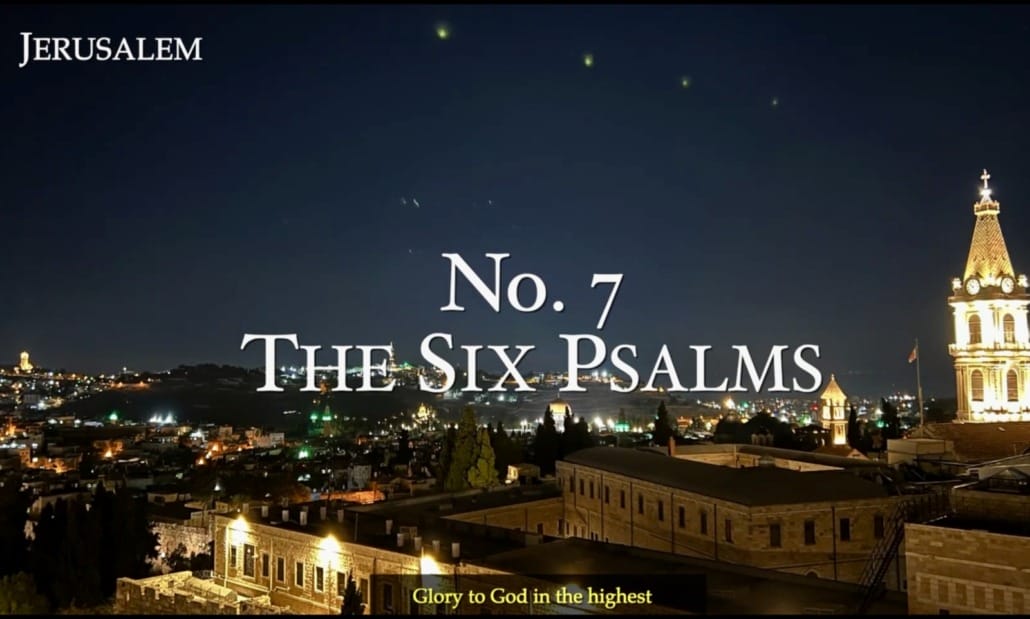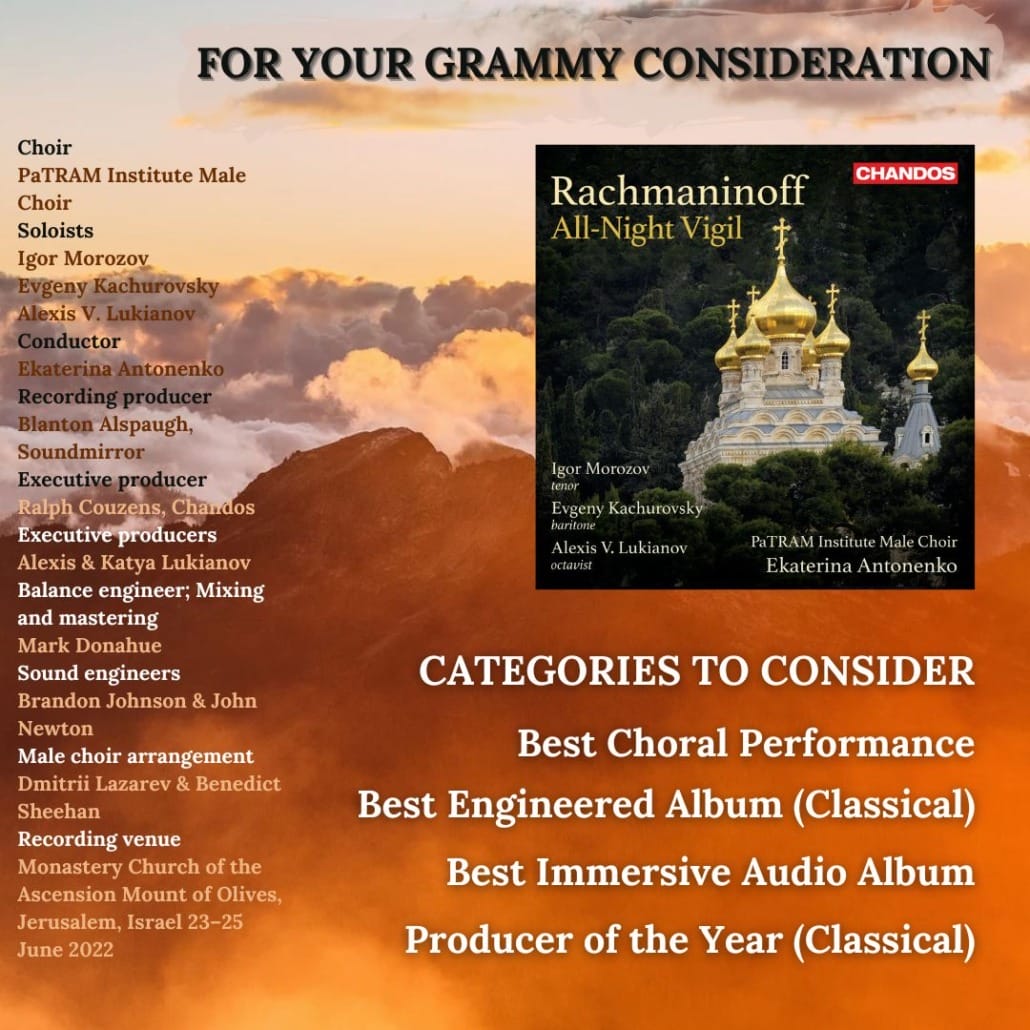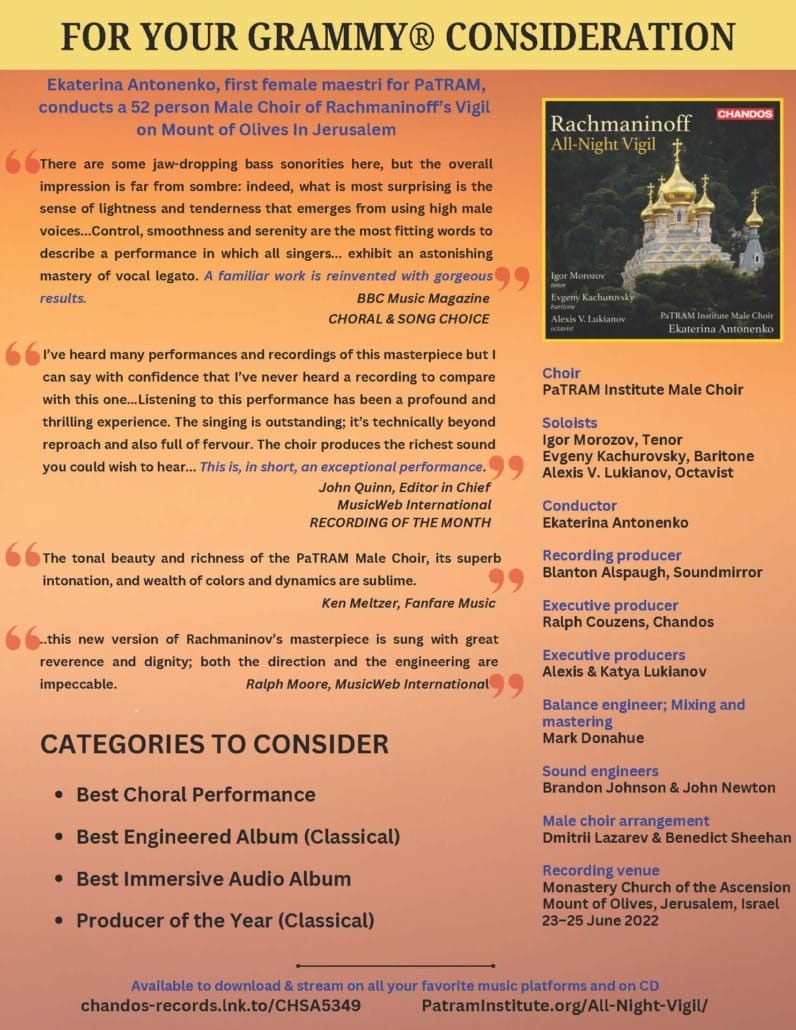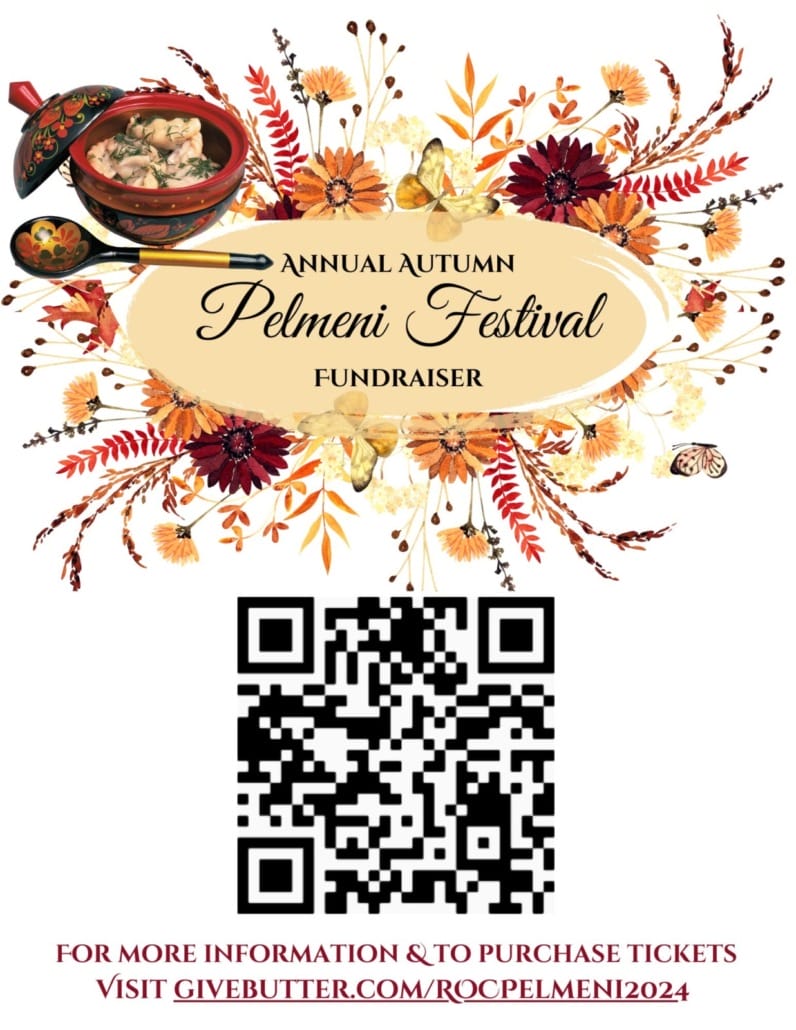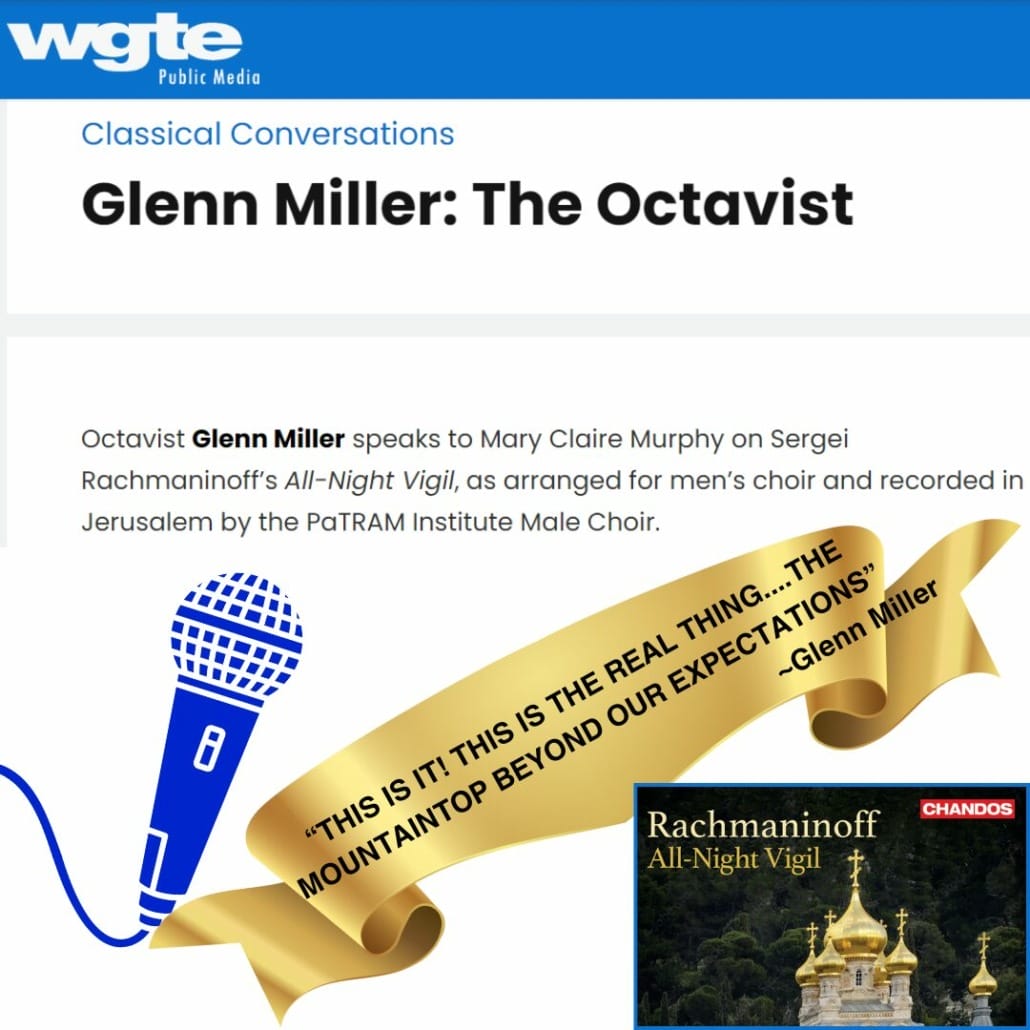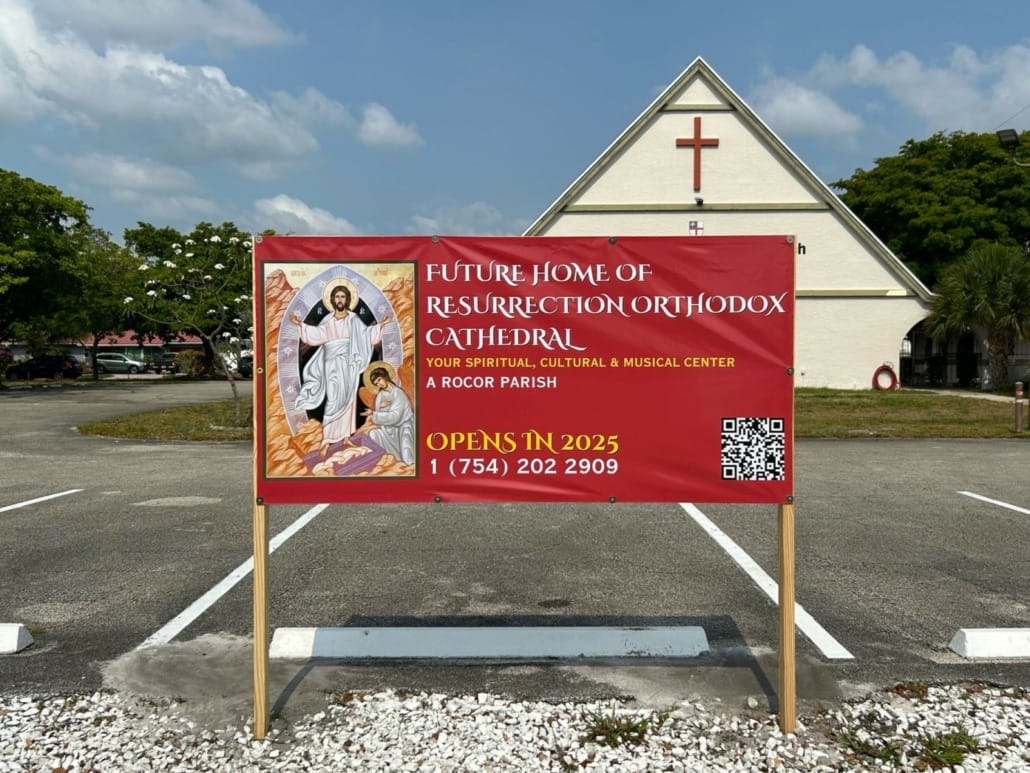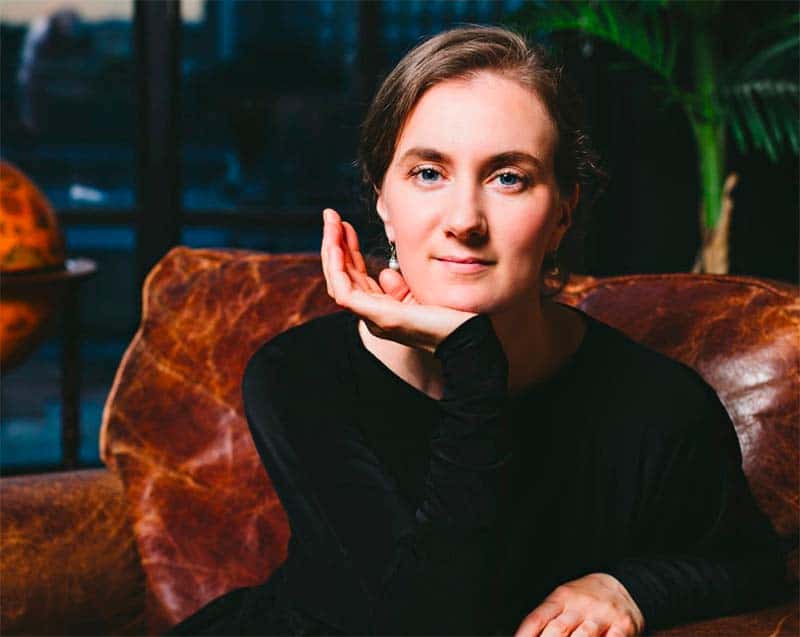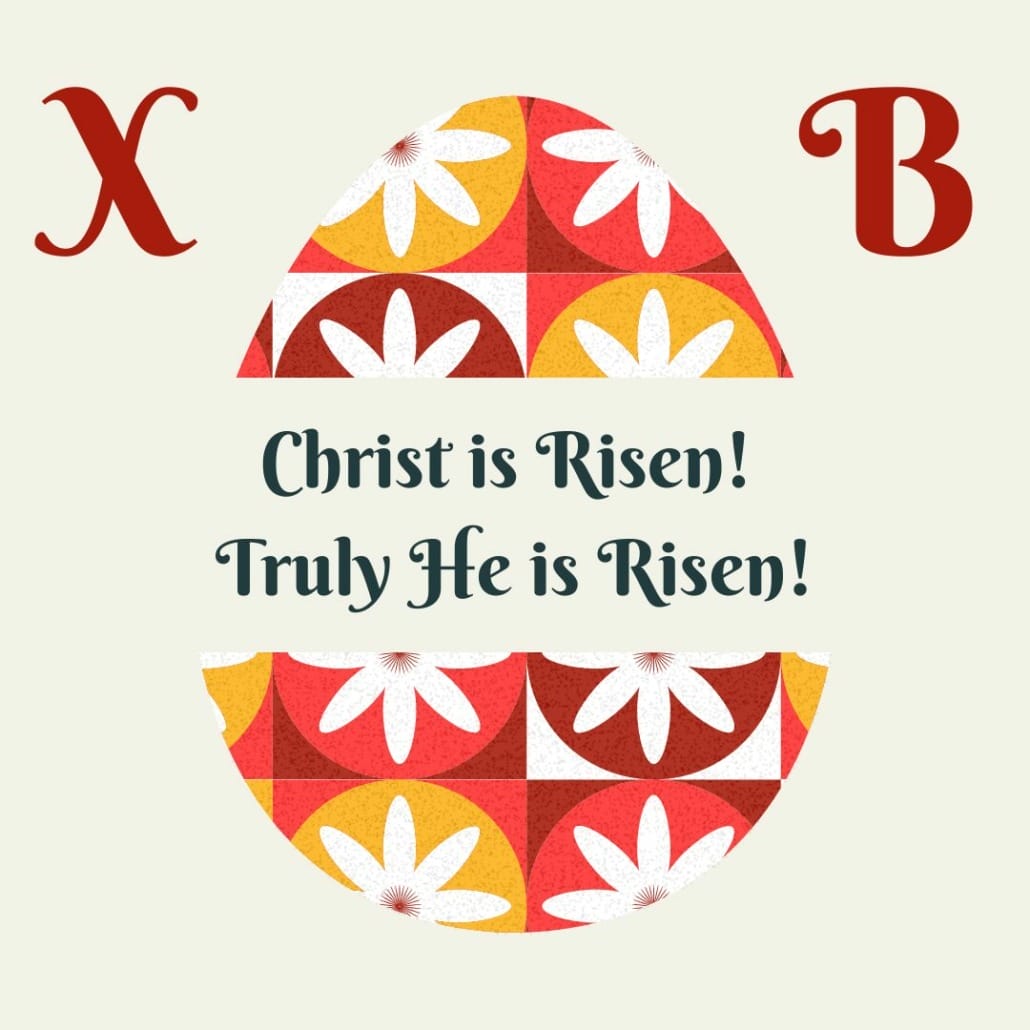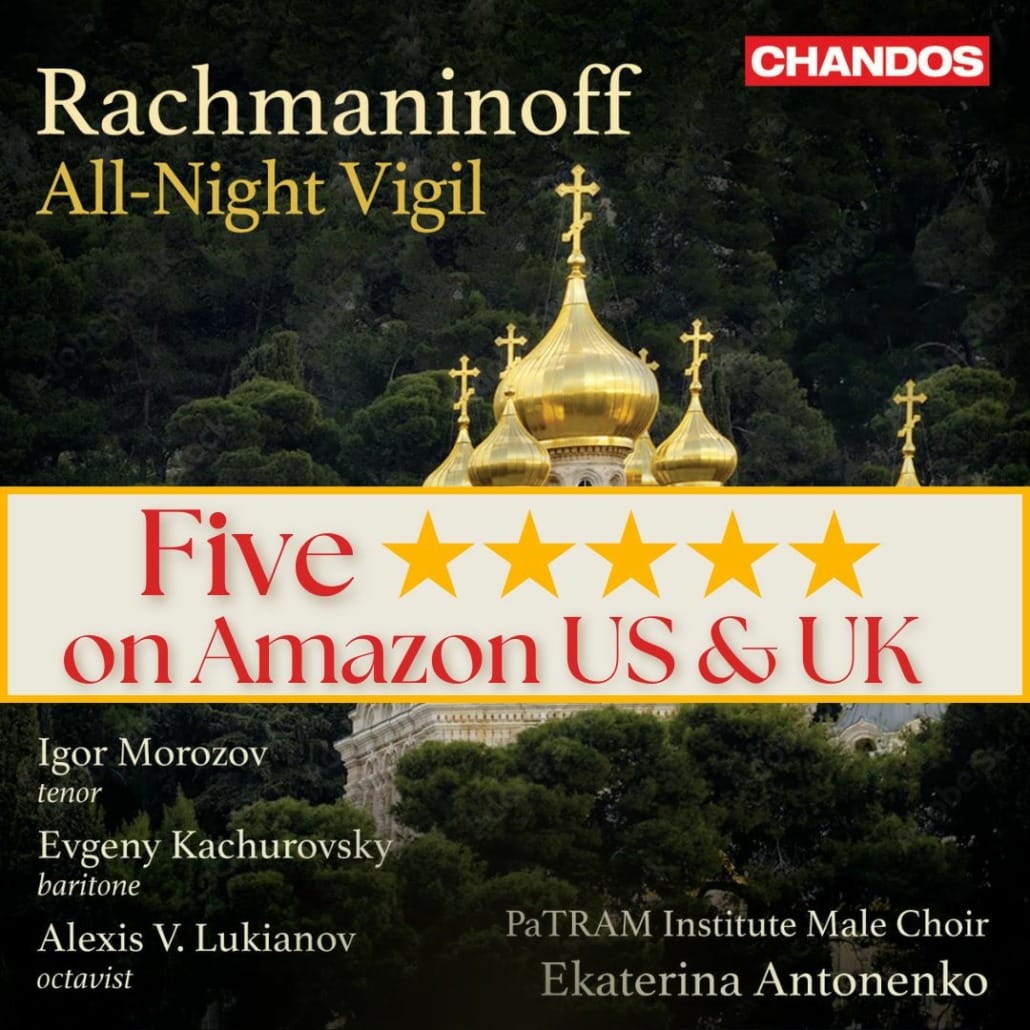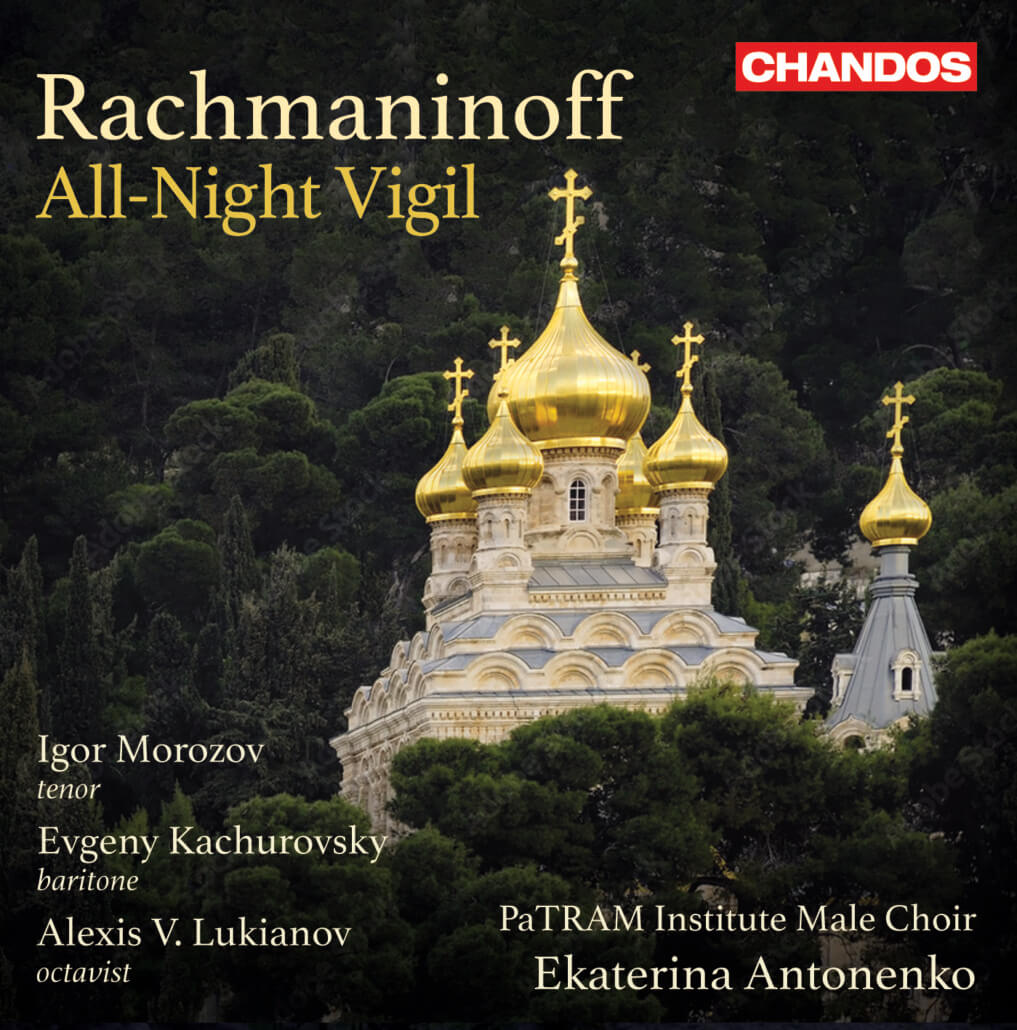Recently, Ekaterina Antonenko engaged in a written interview with James Altena of Fanfare Archive, a periodical our subscribers and readers are very familiar with.
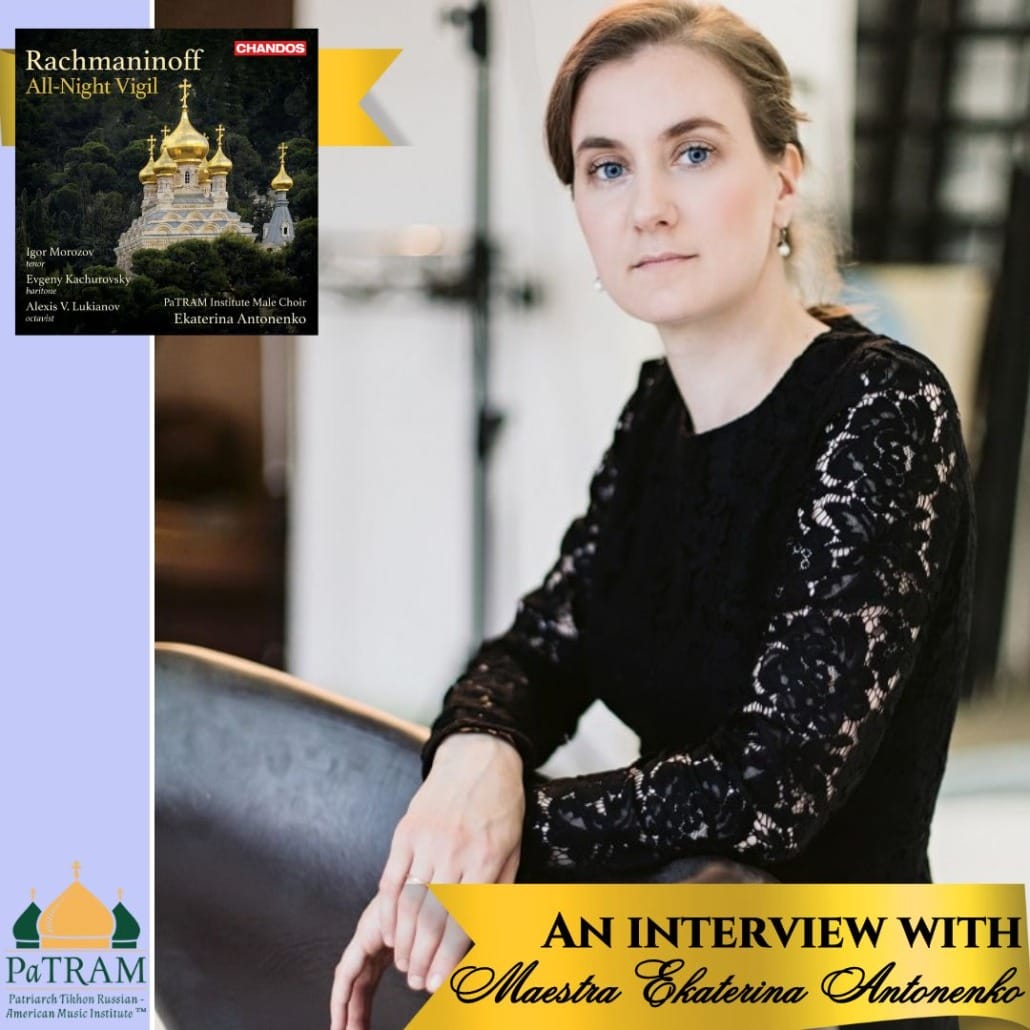
The Maestra was very candid in her responses to Mr. Altena’s questions. We urge you to read the interview (below) and get to know and understand this amazing artist.
In several previous issues of Fanfare I have interviewed a number of figures connected in various ways and degrees to the PaTRAM (Patriarch Tikhon Russian-American Music) Institute—Benedict Sheehan (44:4), Alexis and Katherine Lukianov (44:2), Kurt Sander and Peter Jermihov (43:2), and Vladimir Gorbik (42:3). Now I return to PaTRAM once more for its sixth and newest release: a recording of Rachmaninoff’s celebrated All-Night Vigil (often but improperly referred to in the West as the Vespers), but this time in an arrangement for an all-male choir. The director of this project, the distinguished Russian choral conductor Ekaterina Antonenko, has graciously taken the time to discuss it with Fanfare.
First, let’s introduce Fanfare readers to you. Were you raised in a family with a strong musical background? What first drew you to music, and what was your own musical training (vocal and/or instrumental) when you were growing up? At what point did you decide to make music your life’s calling?
“I cannot say. I was raised in a family with a strong musical background, but I remember a regular scene in my childhood: When my grandfather met his sister, they usually sat and sang for hours. They sang in Russian, Ukranian, Hebrew, and Yiddish. My grandfather was not a musician, though; he was an engineer. But his father, my great-grandfather, was a cantor in the synagogue in the shtetl Staraia Kotelniia, in the Zhytomyr region of Ukraine. My grandfather deeply loved singing and had a beautiful tenor voice. My parents are biophysicists and both of them work at Lomonosov Moscow State University. Somehow already in my childhood I was fascinated by choral sound, and I asked my parents to bring me to a music school. I decided to make music my life’s calling when I entered the Tchaikovsky Academic Music College at the Moscow State Conservatory.”
Your academic musical training took place at three institutions: the Moscow Academic Music College, the Hochschule für Musik und Tanz in Köln, and the Moscow Tchaikovsky Conservatory, with you earning a Ph.D. at the latter in 2013. What were the key aspects of your artistic formation at each institution, and what was the thesis of your doctoral dissertation? And, who were the teachers who especially influenced you?
“At the Academic Music College I received a fundamental education. At the Moscow Tchaikovsky Conservatory, I continued my education with professor Vladimir Sukhanov and finally came out with a Ph.D. degree with a dissertation on the ‘Church Music of Baldassare Galuppi’ (my supervisor was Roman Nassonov). Venetian composer Baldassare Galuppi spent three years in Russia from 1765 to 1768 and influenced the developmental style of Russian church music through his own works and the work of his pupil Dmitrii Bortniansky.
At the Hochschule für Musik und Tanz in Köln I studied with Marcus Creed, who became an example for me in my professional work. During my study at the Conservatory, in 2006, I founded my group INTRADA, and in the following years we collaborated with many leading European musicians, including Peter Phillips, Frieder Bernius, Hans-Christoph Rademann, Stephen Layton, Robert Hollingworth, and Giovanni Antonini.”
Your surname is Ukrainian, and your family background is Jewish. Have you converted to Eastern Orthodoxy? And, have you experienced personal difficulties or discrimination because of your ethnic and/or religious heritage?
“I will tell you more. My surname sounds Ukrainian, but my father has Belarusian roots and comes from a family of Old Believers; his grandfather, whom he never met, was a priest in an Old Believers’ community of Cossacks. My relatives from both sides lost their faith in the Soviet times. I became Russian Orthodox in my 20s and my roots are important to me. I do not see my coming to Orthodoxy as a rejection, but as a fulfillment. I’ve never experienced any discrimination; Ukrainian surnames are quite widespread in Russia. My Jewish ancestors experienced severe discrimination mostly in Tsarist times, going through pogroms and living under restrictions related to the Pale of Settlement.”
The booklet note by Blanton Alspaugh states that “The seed for this album was planted” during recording sessions by PaTRAM of the 2019 album More Honorable than the Cherubim. Can you elaborate more on how this seed came to grow, and to achieve its final fruition in this present release?
“I was not involved in that project, but my understanding is that Alex Lukianov and Blanton Alspaugh conceived of the idea after recording ‘My Soul Magnifies the Lord’ by Rachmaninoff with an all-male choir in Saratov, Russia. Alex Lukianov decided to keep it out of the More Honorable than the Cherubim album, in order to be recorded later in the complete recording that we created in Jerusalem.”
Given the number of excellent recordings of the All-Night Vigil in its original scoring, what do you think is the outward attraction of recording an arrangement for an all-male choir? And, what was the inner compulsion, so to speak, that drove all the participants in this recording to feel the necessity of making it?
“An all-male choir is traditional for the Russian Orthodox church. That’s why shortly after Rachmaninoff finished his All-Night Vigil (in 1915, just two years before the 1917 Revolution and the ban on sacred music that followed in the early 1920s), Alexander Grechaninoff arranged movement No. 7, ‘Glory to God in the Highest,’ for an all-male choir. To sing Rachmaninoff’s original demands great performing forces, and the same can be said about the arrangement because the vocal range requires high tenors and very low basses, whom we had the privilege of having on this recording.
Obviously Rachmaninoff did not have such basses in 1915 as we had for the recording. When he brought his score to Nikolay Danilin, the conductor of the Synod choir, the latter had doubts about the famous final bass passage of the ‘Now lettest thou.’ The oktavists on our recording sing a fifth lower than the original score.”
How would you respond to someone who might say, “I have recordings of the original All-Night Vigil—I don’t need to hear an arrangement”?
“You don’t have to, but it is a unique sonority worth exploring.”
The membership of the PaTRAM Institute Choir changes significantly from recording to recording. How were the singers recruited for this project? How many were Russian, and how many American? Did they have to pay their own expenses to travel to Jerusalem, or was there a sponsor for that? And, how difficult was it to recruit eight oktavists for this recording?” The PaTRAM Choir has its own history and traditions. Alex Lukianov, the head of PaTRAM, a fantastic oktavist and the main sponsor of PaTRAM, invited me to conduct this project and kindly asked us to invite singers from Russia—there were 16 of them in the choir, and two soloists. The oktavists came from all over the world—the USA, Canada, and Russia.”
At present, Russian-American relations are troubled, to say the least, by the ongoing military conflict in Ukraine. Were there tensions between choir members with opposing views on this terrible situation, and if so how were those dealt with?
“There were no tensions. I will tell you more: Alongside 15 Russians, we had one tenor with a Ukrainian passport. There were bureaucratic issues we had to go through, but no tensions in the choir; we were in Jerusalem to make music and to be together. It was a wonderful trip in many aspects; there were Russians, Serbs, Americans, Canadians, and Australians. It was a pure joy to meet accomplished singers and people of faith from all over the world in the Holy Land.”
Was the Church of the Ascension on the Mount of Olives in Jerusalem deliberately chosen as a recording site for symbolic reasons, such as to suggest neutrality or reconciliation in strife-torn parts of the world? (A personal story: In 1994 I lived in Jerusalem for three months while performing research for a Ph.D. dissertation. When an elderly friend visited me there from the USA, we went to visit various holy sites. We went up onto the Mount of Olives to visit this church, but could not find our way through the surrounding fence and gave up. On our way back down, some Palestinian youths hurled stones at us and cursed us!)
“We were not making political statements with our concerts and recordings. We were honoring Rachmaninoff in his 150th year, and were humbled with gratitude to be in the Holy Land for this epic recording. We saw Palestinian youths right after completing our recording tangling with other individuals; the police were forced to use tear gas, which made its way to the monastery and affected several of our singers. The Church of the Ascension on the Mount of Olives is the heart of the Russian mission in Jerusalem, and also was chosen thanks to its wonderful acoustics. The picture on the cover of our album is of St. Mary Magdalene Church on the Mount of Olives. We chose that for our background, as it is clearly visible from Old Jerusalem and a highly recognizable part of the skyline.”
In your own booklet note, you state that Alexander Grechaninoff’s arrangement of movement No. 7, “Glory to God in the Highest,” was the starting point for this project, with the additional movements being adapted by Dmitrii Lazarev in Russia (Nos. 3–5, 8, and 9) and Benedict Sheehan (Nos. 1, 2, 6, and 10–15) in the USA. How was this division of labor determined? How would you characterize the similarities and differences in approaches to adapting this music by the three arrangers?
“Benedict Sheehan, like Alexander Grechaninoff, strives to preserve Rachmaninoff’s texture in full, so the numbers in his arrangement are basically Rachmaninoff’s score in transposition. This is also true for number 3 in the arrangement of Dmitrii Lazarev. For the numbers 4, 5, 8, and 9 we decided to stay in the original key of the piece, and these numbers were arranged by Lazarev with the same leading principal solo part to stay as close to Rachmaninoff’s score as possible.”
It strikes me that one of the most difficult aspects of performing an arrangement of an original SATB score for a TTBB choir is to achieve both suitable balances and clarity of lines between the different sections that normally would be distinguished by a contrast between female and male voices, and the placement of some upper vocal lines an octave higher. How did you adjust for that?
“In fact, Rachmaninoff’s All-Night Vigil was first performed by the Synod choir, which consisted of men and boys, and so the balance within the choir was different from what we are used to nowadays. There are memories of a former singer of the Synod choir, Alexander Smirnov, about the rehearsals for the first performance of the All-Night Vigil in Rachmaninoff’s presence. And there is a passage about the balance of choral parts where Smirnov says that the Synod choir was structured from the heavy bottom line of oktavists to the light upper line of boy sopranos (called diskants). We had this model in mind when recruiting singers, and in the process of our rehearsals and recording. That is why having eight oktavists was so important for us, and that is why we have a number of countertenors singing the upper line because countertenor is the lightest male voice.”
What is the difference, if any, between a “contra tenor” (per the booklet description) and a Western countertenor? And, did you ever consider an SATB performance using boy sopranos and male countertenors for the soprano and alto parts?
“I do not see a significant difference between a ‘contra tenor’’ and a Western countertenor. However, a ‘contra tenor’ would have to sing the standard first tenor line most of the time, which can be inconvenient for a countertenor.
SATB using boy sopranos and male countertenors is outside of the tradition of Russian church music. But there are wonderful performances of Rachmaninoff’s masterpiece by British choirs using such a model.”
What are the goals you hope to achieve with this recording?
“We simply worked hard to perform the best version we could muster of a unique work, and to offer a reverent tribute to Rachmaninoff with an all-male choir. I am personally delighted with all aspects of our global premiere, and incredibly grateful to our singers and PaTRAM for making it possible.”
What are the immediately upcoming plans for yourself, and likewise for the PaTRAM Choir?
“My immediate plans include performing Alfred Schnittke’s Penitential Verses and a program of Flemish polyphony, directing Handel’s Brockes-Passion and Dixit Dominus, and performing and recording the newly composed Mass by Alexey Sysoev.
Alex Lukianov is presently spearheading the building of the Resurrection Orthodox Cathedral in Deerfield Beach, FL, which is slated to open in 2025 together with a musical and cultural center. PaTRAM will also be headquartered at the cathedral and have professional choirs singing worship services. Knowing him, I imagine he will want to do a tour to perform Rachmaninoff’s All-Night Vigil after completing the cathedral, whenever our singers can travel to the USA.”
Thank you for the honor of this interview!
If you’d like to obtain a copy of the CD, please go to the PaTRAM website for a list of outlets. This recording can also be enjoyed on all your favorite digital music platforms.
As always, we thank our supporters and subscribers for their continued loyalty and support.
